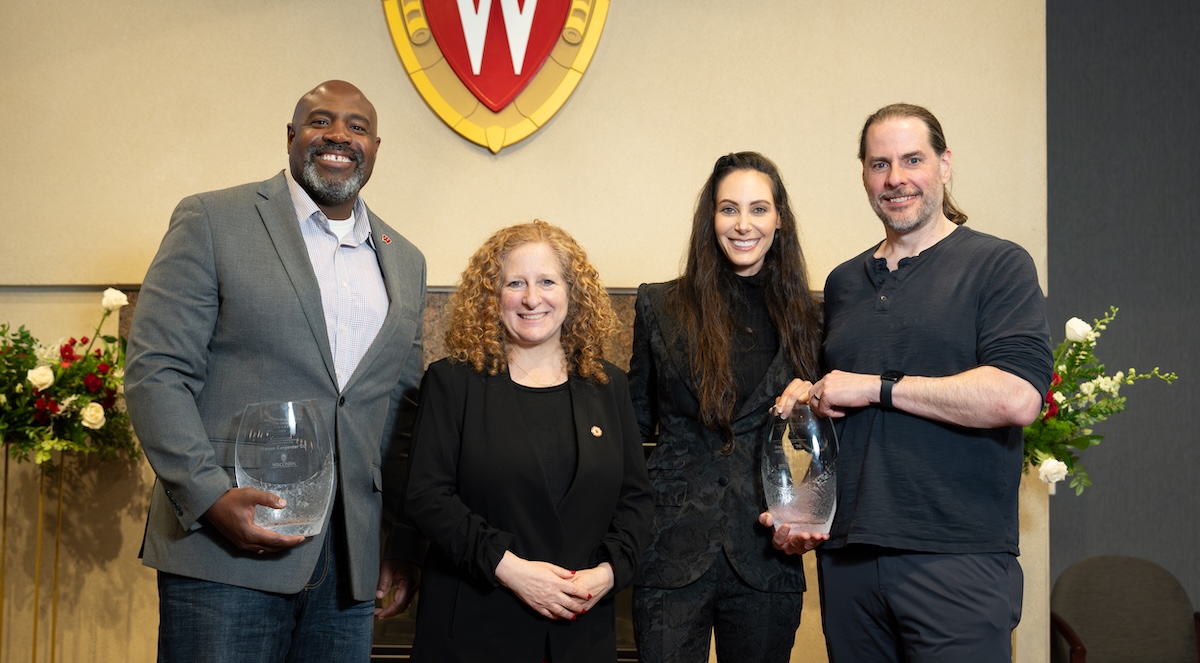Greg Piefer, founder of Morgridge spinoff company SHINE Technologies, is among three outstanding recipients of the 2025 Chancellor’s Entrepreneurial Achievement Award.
Established in 2011, the Chancellor’s Entrepreneurial Achievement Award recognizes UW–Madison innovators and alumni who have contributed to economic growth and the social good, serving as entrepreneurial models for the UW community and inspiring the campus culture of entrepreneurship.
“What unites this year’s outstanding honorees isn’t what they do — it’s why they do it,” said Chancellor Jennifer L. Mnookin. “Each has taken a distinct path into entrepreneurship, yet all are driven by the same purpose: to improve lives and expand opportunity. That’s the Wisconsin Idea in action.”

Just down the road from UW–Madison, Piefer is quietly building one of the most ambitious energy companies in the world.
In Janesville, a city now known for atomic particles as well as auto parts, SHINE Technologies is advancing cutting edge solutions for healthcare, clean energy, and national security — all through nuclear fusion. But that’s only the beginning. Piefer’s ultimate goal? Affordable and sustainable fusion energy.
“He is motivated by making a difference,” former Speaker of the House Paul Ryan said. “And because of him, Janesville is serving a greater purpose in that we’re solving a lot of society’s big problems.”
Motivation like Piefer’s doesn’t just appear. It’s born of relentless curiosity. He was the kid with his nose in a book, even at recess. He was especially obsessed with space travel, energy generation and other high-tech human frontiers.
At UW–Madison, that focus crystalized into purpose. He would regularly watch train cars carrying heaps of black coal rumble past, destined for the campus heating plant. He knew there was a better way. Only a few of those same cars, filled with fusion fuel, could power the entire country with no adverse climate impacts. The question was how.
Piefer was undaunted. “I wanted to play a direct role in creating that future,” he said. “I’ve always been a dreamer. I’ve always believed we can do really hard things. And I’ve always tended to see the path forward as opposed to the difficulties.”
That path started first, as all great discoveries do, with a question. It became an experiment that morphed into Piefer’s graduate research. Finally, he perfected the processes and spun off his inventions into a company using fusion-based technology originally patented through the Wisconsin Alumni Research Foundation.
The technology behind SHINE made important advances while Piefer and his team were housed at the Morgridge Institute, backed by a $20 million research partnership with the Department of Energy.
Piefer and SHINE are currently focused on a four-phase strategy to first commercialize near-term technologies on the way to generating fusion energy: industrial neutron testing to inspect aerospace and defense components; medical isotope production to address global shortages of materials used in cancer and cardiac care; nuclear waste recycling to reduce environmental and security risks; and ultimately, generating clean, abundant and affordable fusion energy.
With recent federal grants and private investment, Piefer is closer than ever to that long-ago vision he had as a UW–Madison graduate student to heal, protect and power the world with sustainable energy.
I’ve always been a dreamer. I’ve always believed we can do really hard things. And I’ve always tended to see the path forward as opposed to the difficulties.
Greg Piefer, ’99, MS’04, PhD’06
He’s still driven by curiosity, but also by an “excitement to level up humanity.”
“That’s no less than the opportunity we have,” he said. “Those words are not too big. And I think it’s going to be hard. [But] I see a company that has a really awesome culture and that’s providing real value. We’re looking backward at the value we created while looking forward, too, at what’s next and with enthusiasm for a better world.”
With more than 20 years of experience in commercializing scientific breakthroughs, Piefer holds multiple patents and three UW–Madison degrees — including a PhD in nuclear engineering and engineering physics with a minor in medical physics.
“We’ve chosen some of the most difficult things to do on earth,” Piefer said, “But I tend to see the way forward and discount the difficulties. You have to, I think, to be an entrepreneur, or you just wouldn’t do it. “
The Chancellor’s Entrepreneurial Achievement Awards continue to spotlight UW–Madison alumni whose work embodies innovation for the public good — in communities throughout Wisconsin and countries around the world.
The Office of the Chancellor, in partnership with the Wisconsin Foundation and Alumni Association, recognized 2025 recipients of the Chancellor’s Entrepreneurial Achievement Awards during the annual awards event on April 23.
Other 2025 winners include:
Marcus Carpenter ’00, Founder, Route 1
As the founder of Route 1, a Minnesota-based resource hub for Black, Brown, and Indigenous farmers, Carpenter helps farmers cultivate profitable agricultural enterprises and offers support in land acquisition, agribanking, equipment access, and farm-share distribution — all while also addressing food insecurity in communities that most need access to fresh food. Route 1 partners with organizations like the USDA, The Toro Company Foundation, and the Bush Foundation to connect farmers of color with essential resources.
Heather Hasson ’04, CEO & Co-Founder, OOG.Health; Co-Founder & Executive Chair, FIGS
Hasson launched FIGS in 2013 and set out to revolutionize the healthcare apparel industry for people she regularly refers to as “Awesome Humans.” FIGS donates scrubs to clinicians in under-resourced communities around the globe and to medical professionals during disasters in the United States. Hasson’s latest venture, OOG.Health, is a continuing education platform that helps busy healthcare professionals earn the credits they need to stay current by utilizing AI in the evaluation process. It, like everything else she does, is designed to improve the quality of life for her “heroes.”
